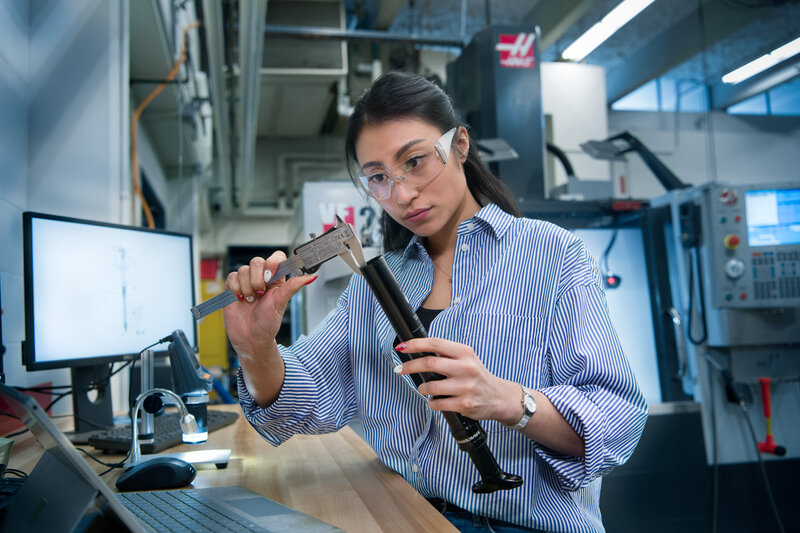Lenissa Pereira wanted to find a career that allowed her to work with her hands, see the world, and earn a good wage.
Like more and more women, she decided on one of the many engineering options offered at BCIT, a choice she’s glad she made.
“This was an excellent career choice for me”, says Lenissa, an alumna who studied Marine Engineering and finished her diploma in 2016. During her program, she obtained her Fourth engineers license. Since then, the 25-year-old has steadily moved up the ranks and now holds the position on the ship as Second Engineer. Her work at sea has taken her to places like Amsterdam, Turkey, Nunavut, and beyond.
“I could see all the icebergs floating down the coast of Greenland and it was a breath taking view”, she recalls. When she arrived in Milne Inlet in Baffin Bay by ship, located in Northern Nunavut, Canada, she saw ice fields on mountain ranges and the spectacular Northern Lights. “When you travel by ship, it’s a different feeling, there is sense of freedom when sailing in the open seas.”
Co-op: Experiential learning is key to getting a job
The BCIT Marine Engineering program is a four-year cadet co-operative (co-op) diploma that combines hands-on, theoretical, and technical training—including sea service placements. This means students like Lenissa get important on-the-job training to be able to work on large oceangoing ships and to be ready to work in land-based positions too.
The co-op format also helped financially. Lenissa earned enough money in her first work placement to pay for her entire tuition, finishing school without any student loans. In addition, after graduating, she was offered a job by the very company she completed her first co-op term.
The practical and theoretical skills she gained at sea paid off in other ways, such as increasing self-confidence and acquiring valuable experience in the real world. It helped to hone her hands on skills and knowledge of various machinery onboard ships in order to continue her career in marine engineering.
“What you study at the Marine Campus in the four-year program—to when you go out and apply it at each sea phase, prepares the cadet when they graduate from the program. During the course of the program, the cadet builds a relation with their employer through their sea phase assignments. This can be easily attributed to BCIT, which has maintained its professionalism and excellent relations amongst the shipping companies in the marine industry.”
She was the only female student in her cadet program, and she’d like to see that change.
Her fellow classmates were supportive, as were her BCIT instructors, she says, and she’s glad she persevered. Last year, Lenissa was invited back by the school to speak with potential students about her experience at BCIT.
“My message to woman is to try to reach new horizons, and to step outside your comfort zone, because that’s where dreams are achieved,” says Lenissa.
Have you subscribed? Sign-up to receive the latest news on BCIT.
Choosing a career: start with industry connections
Karen Kan chose to study Mechanical Engineering in order to pursue her passion for design — and learn how buildings work from that perspective.
“What I do is building system design. What makes it enjoyable is knowing that these designs such as in HVAC and plumbing are essential to occupant comfort in buildings,” explains Karen, who graduated with a degree from BCIT last May.
“Whether it is working from home or from the office, long hours indoors require design considerations that allow occupants to be comfortable to work efficiently.”
Her advice to anyone who might be considering a future in Mechanical Engineering?
“Choosing a career while still in high school is daunting. I get it, I’ve been there,” she says. “If you’re considering this field, reach out to others already in this industry. Prepare questions to ask so that you can gain a better understanding before you decide.”
She liked the smaller class sizes at BCIT, something that helped students connect more easily with instructors.
“I would recommend others to this program because of the guidance they will receive, as I did, and the difference it will make in a challenging program,” says Karen.
She also found support outside of the classroom as part of the BCIT Women in Engineering Club.
“There I met like-minded individuals that I could share my difficulties with. I would highly recommend future students to take part in chapters and clubs,” Karen says. “It’s a great way to network and build lasting friendships.”
Karen adds, choosing what to study shouldn’t be about your gender: “It’s important for everyone to pursue their interest.”
The importance of normalizing women in engineering

Fellow alumna, Amanda Gomes, P. Eng., agrees. Diverse representation in engineering is extremely important.
It demonstrates to the younger generation that the industry has changed and is more inclusive.
“I think it’s very important to normalize women in engineering,” says Amanda. “Yes, we’re here. Yes, we can do it.”
While completing her degree in Civil Engineering at BCIT, she was president of the Women in Engineering Club.
“Clubs like BCIT Women in Engineering ensure women have the opportunity to speak up and show that female role models are available,” says Amanda.
Working as a Project Manager she leads design and construction teams on industrial, mixed-use, and institutional programs, including things like a church redevelopment project, and the development of the largest business park campus in Metro Vancouver, to name a few.
She plans to get her Project Management Professional (PMP) certification this year and potentially her MBA one day.
Amanda credits her continued growth and success to her many role models including mentors she’s gained at BCIT and throughout her career.
“I find that people are open to giving feedback and sharing their path to success,” she says. “All you have to do is ask, be proactive, and be open to learning new perspectives and paths.”
BCIT is the place to begin a career in engineering
As a leading contributor of engineering professionals in the province, BCIT offers over 70 engineering and engineering technology programs—many taught by female industry professionals.
Whether it’s making it faster, smarter, or more economical, engineers are responsible for imagining solutions to complex problems across a range of exciting industries. Choose from innovative degree and diploma options in mechanical, electrical, civil, mining and mineral resource, aviation, and marine engineering. A career in engineering is a keystone profession that unlocks new energy efficiencies, develop growing sustainable cities, and re-imagine some of our country’s biggest industries. Learn more about Engineering programs available at BCIT.
SEE MORE: Not sure what type of engineering you want to study? Read this
(This story is written by Chantal Eustace)
